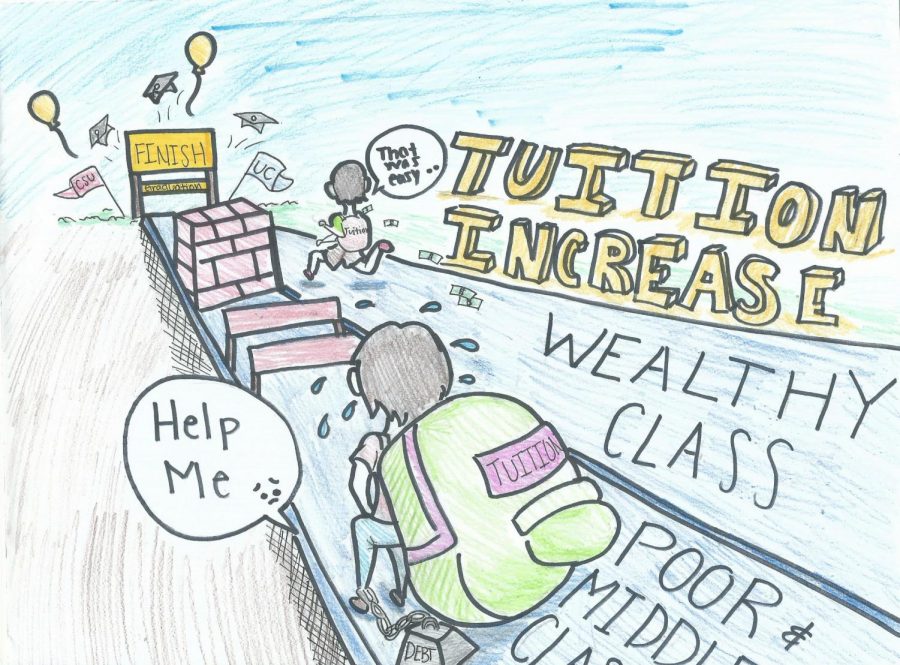UCs and CSUs decree higher tuition fees
This cartoon symbolizes how the hike in tuition fee will affect students who are both entering and studying at current UCs and CSUs. The issue of raising tuition fees won’t be voted on until May.
March 14, 2018
Last month, the University of California’s board of regents approved a 2.7 percent tuition hike, or $342 increase for an academic year, after a six-year long freeze on tuition increases.
“It’s annoying because they are raising their tuition but we’re still getting the same amount of financial aid,” said senior Ruzanna Manvelyan, who was accepted into more than one UC.
The decision comes after months of deliberation plagued by student protests and opposition from higher ups. The original vote that was to take place Jan. 24 was delayed due to student petitions rejecting a tuition increase and a letter written by Gov. Jerry Brown to the board of regents. The letter was an outreach to the board urging them to vote against a tuition raise he felt was premature and a burden on students.
Brown claimed state funding towards the University of California had increased $1.2 billion since 2012, but UC President Janet Napolitano stated that per-student funding is less than half of what it was 20 years ago. This year, Brown proposed a measly 3 percent increase in base funding for the University of California and the Cal State systems compared to the 4 percent given in previous years. The UC board of regents is worried about this decreased funding and feels a tuition hike will keep the 10-campus system at the level of prestige it is at now.
UC officials are proposing an increase of $342 for students, which would bring state residents’ costs to $12,972 for 2018-19. Nonresident students would pay an additional $978 in supplemental tuition to bring their total to $28,992, according to “UC regents to vote on increasing tuition and student fees by $342.” This is planned to raise about $137 million.
In an attempt to remedy the stress of these new costs, the university plans to provide free tuition to families making under $100,000 instead of families that make $80,000 like in previous years. However, middle class families will still be affected by the $342 increase. The money that could’ve gone toward textbooks for classes or trips to see family is now going towards an already pricey tuition.
The UC system has admitted some of its staff is overpaid yet no attempt has been made to remedy this problem and save students money. The board’s decision was not unanimous and it can be inferred that members John A. Peréz, student member Marcela Ramirez, Lt. Gov. Gavin Newsom and State Superintendent of Public Instruction Tom Torlakson feel that there are other alternatives that haven’t been considered.
Now, as the Cal State system proposes a $228 increase in its 2018-2019 tuition, students are pushed further on edge. The 23-campus system also believes the governor’s budget isn’t enough and will lead to decreased student success, untimely degree attainment and a reduction in quality education. According to CSU Chancellor Timothy White, the increase won’t be voted on until May.
“Tuition fees always go up but people still pay for it so it’s nothing new,” Manvelyan said.









